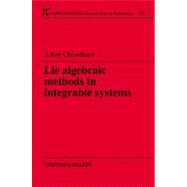- ISBN: 9781584880370 | 1584880376
- Cover: Nonspecific Binding
- Copyright: 9/28/1999
Over the last thirty years, the subject of nonlinear integrable systems has grown into a full-fledged research topic. In the last decade, Lie algebraic methods have grown in importance to various fields of theoretical research and worked to establish close relations between apparently unrelated systems.The various ideas associated with Lie algebra and Lie groups can be used to form a particularly elegant approach to the properties of nonlinear systems. In this volume, the author exposes the basic techniques of using Lie algebraic concepts to explore the domain of nonlinear integrable systems. His emphasis is not on developing a rigorous mathematical basis, but on using Lie algebraic methods as an effective tool.The book begins by establishing a practical basis in Lie algebra, including discussions of structure Lie, loop, and Virasor groups, quantum tori and Kac-Moody algebras, and gradation. It then offers a detailed discussion of prolongation structure and its representation theory, the orbit approach-for both finite and infinite dimension Lie algebra. The author also presents the modern approach to symmetries of integrable systems, including important new ideas in symmetry analysis, such as gauge transformations, and the "soldering" approach. He then moves to Hamiltonian structure, where he presents the Drinfeld-Sokolov approach, the Lie algebraic approach, Kupershmidt's approach, Hamiltonian reductions and the Gelfand Dikii formula. He concludes his treatment of Lie algebraic methods with a discussion of the classical r-matrix, its use, and its relations to double Lie algebra and the KP equation.






